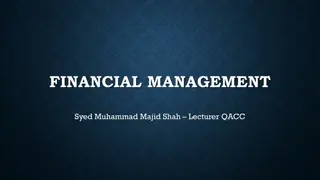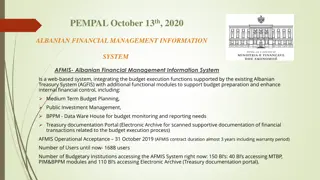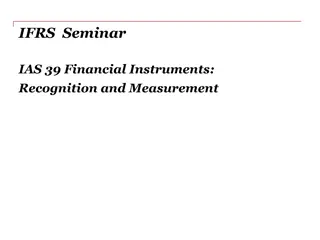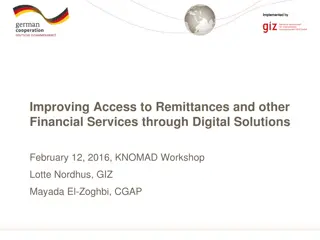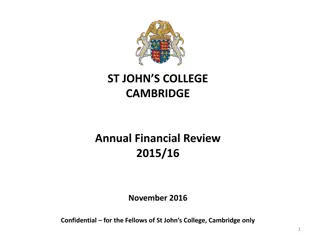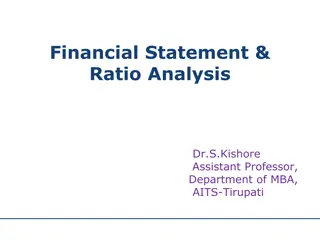Overview of Financial Management Principles
Financial management is a vital managerial process focusing on planning and controlling financial resources. Initially centered on fund collection, modern financial management emphasizes both fund collection and efficient utilization. The characteristics of the modern approach include increased emphasis on financial decisions, integration into overall business management, continuous function, broader perspective, and performance measurement. Approaches to finance function transitioned from traditional procurement-based methods to modern holistic decision-making encompassing investment, financing, and dividend choices. Financial management involves functions like planning, decision-making, investment, dividend policy, control, and other related activities. Objectives include profit maximization and wealth maximization approaches.
Download Presentation

Please find below an Image/Link to download the presentation.
The content on the website is provided AS IS for your information and personal use only. It may not be sold, licensed, or shared on other websites without obtaining consent from the author.If you encounter any issues during the download, it is possible that the publisher has removed the file from their server.
You are allowed to download the files provided on this website for personal or commercial use, subject to the condition that they are used lawfully. All files are the property of their respective owners.
The content on the website is provided AS IS for your information and personal use only. It may not be sold, licensed, or shared on other websites without obtaining consent from the author.
E N D
Presentation Transcript
Nature And Scope of Financial Management Financial management is such a managerial process which is concerned with the planning and control of financial resources. In the initial years of its development, financial management was concerned only with collection of funds for business. But according to modern viewpoint, not only collection of funds but also their proper utilisation are the basic functions of financial management. Financial manager has become as important constituent of business and he provides his significant contribution to all business activities. He estimates the requirement of funds, plans the different sources of funds and performs the functions of collection of funds and their effective utilisation. As all the business activities like marketing, purchase, production etc include the creation and utilisation of funds, financial manger must be clear about his duties and responsibilities in relation to these activities. Characteristics of Modern Approach 1. More Emphasis on Financial Decision 2. Financial Management as an Important Component of Business Management 3. Continuous Function 4. Broader View 5. Measure of Performance
Approaches to Finance Function or Financial Management 1. Traditional Approach to Finance Function : Under this approach, financial management was used to procure and administer funds for the corporation. The following three things were used to be studied for the procurement of finance. i. Institutional sources of finance. ii. Issue of financial instruments to collect necessary funds from the capital market. iii. Legal and accounting relationship between the business and source of finance. According to this approach, finance manager was not responsible for the efficient use of funds. Limitations of Traditional Concept :- 1. One sided Approach 2. More Emphasis on the Financial Problems of Corporations 3. More importance to Sporadic (Long Term effect) Event 4. More Emphasis on Long term funds
Modern Approach to Finance Function According to this approach, financial management considers the broader and analytical viewpoint. According to this approach, financial management is concerned with both acquisition of funds and their effective and optimum utilisation. This viewpoint not only considers the sporadic events but also the long term and short-term financial problems. Three decisions are taken under financial management :- i. Investment Decision ii. Financing Decision iii. Dividend Decision
Meaning of Financial Management J.L. Massie :- Financial Management is the operational activity of a business that is responsible for obtaining and effectively utilising the funds necessary for efficient operations. Functions of Financial Management 1. Financial Planning 2. Financial Decision 3. Investment Decision 4. Dividend Policy Decision 5. Financial Control 6. Incidental Functions
Objectives of Financial Management (i) (ii) Profit Maximisation Approach Wealth Maximisation Approach (i) Profit Maximisation Approach :- According to this approach, a firm should undertake all those activities which add to its profits and eliminates all others which reduce its profits. Criticism (i) Ambiguity (ii) Time Value of Money (iii) Risk Factor
Wealth Maximisation Approach :- According to this approach, financial management should take such decisions which increase net present value of the firm. W = A1 (1+k) + A2 (1+k)2 An (1+k)n + . + - C W = Net PresentValue A1+ A2 benefits from a course of action over a period of time. K = Appropriate discount rate to measure risk and timing C = Initial outlay to acquire that asset or pursue the course of action. If W is positive, the decision should be taken. On the other hand if W is negative, the decision should not be taken. An= Stream of expected cash + . +
Importance of Financial Management (1) Significant part of Business Management (2) Liquidity and Profitability (3) Value of firm (4) Centralised Nature (5) Benefits to shareholders Benefits to Investors (6) Other Benefits









